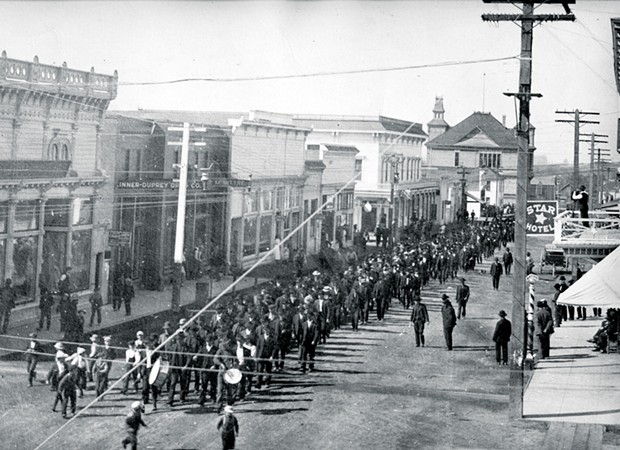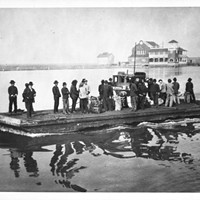
Photo courtesy of the Fortuna Depot Museum
Protesters march in Fortuna in 1906 in opposition of a cannery bringing in Chinese workers.
[
{
"name": "Top Stories Video Pair",
"insertPoint": "7",
"component": "17087298",
"parentWrapperClass": "fdn-ads-inline-content-block",
"requiredCountToDisplay": "1"
}
]
Editor's note: This story, which originally ran in the Ferndale Enterprise, includes racist language in quotations from historical newspaper articles.
On Sunday, Sept. 30, 1906, one day after a mixed-race workforce of Chinese and Japanese men and white women arrived at the Starbuck-Tallant Co.'s salmon cannery in Port Kenyon, a mass meeting took place in Fortuna. Humboldt County labor organizers had been preparing throughout the summer to forcibly object to any "importation of Chinese" laborers to the county. Now the time had come to put their planned protests into action.
The Humboldt Times reported, in even more viciously racist terms than those used in other articles on the controversy, that the Fortuna Board of Trade had appointed a committee to visit Ferndale and "learn why Ferndale had ignored the unwritten law of the county, and contaminated the air of Humboldt with the filthy Chinese, whom the fathers of the present generation were forced to resort to strenuous means to eject." C. R. Johansen of the Eureka Building Trades Council accompanied the committee from Fortuna and was interviewed by a Times reporter. Johansen gave the following opinion on Ferndale businessmen's attitude:
"When you talk of mass meeting, to feel the public pulse ... they shake their heads and say, 'Oh, what's the use. They're here, so let 'em stay. We can't help it; what can we do; the cannery men say that if the Chinese are molested they will telegraph to the governor and have militia sent to protect them, and if we walk across the street we will be shot.' I tell you they don't want to call a public meeting. That man Tallant has pumped it into the merchants that it is impossible, has been impossible and always will be impossible, to run a cannery without Chinese, and they believe it and have even begun to make other people in the valley believe it."
While the Ferndale businessmen and the managers of the cannery may not have wanted to hold public meetings on the issue, such meetings took place in Fortuna every day of that week. In an article reprinted by The Ferndale Enterprise on Oct. 5, 1906, The Fortuna Advance reported,
With the arrival in Humboldt of these Chinese a wave of indignation was at once aroused and meetings have been held all over the county since that time. On Sunday evening many citizens of Fortuna assembled in response to a call at Diamond Hall ... In the meantime the matter had been taken up by the woodsmen all over the county and a second meeting was held in Fortuna Monday evening without anything definite being done, the men preferring to await the result of the citizens' meeting last evening. Word was received in Fortuna ... that men from all of the camps of the county would be ready to assemble to drive the Chinamen from the county but all were asked to keep cool and see what could be done by peaceable means. With the closing down of the Newburg woods ... the men began to assemble in Fortuna from that camp. The town trustees had taken the precaution early in the day to request the saloon keepers to keep their places closed and the request was willingly granted. It was a quiet and orderly crowd throughout the evening, but the determined spirit of the men could easily be seen.
A committee of cannery stockholders who attended a meeting in Fortuna on Tuesday afternoon was less convinced of the "quiet and orderly" nature of the crowd. The Enterprise reported that the committee had gone to Fortuna "to endeavor to adjust the bitter feeling that existed in that place over the unfortunate matter." Instead, the Ferndale representatives made a hasty, prudent retreat. According to the Oct. 5, 1906 Enterprise, "The Ferndale committee did not stay to the Fortuna meeting Tuesday evening as they were advised not to do so by residents of Fortuna, the fear being expressed that excitement might reach a pitch that the Ferndalers might suffer insult." That evening, leaders of the Fortuna meeting presented a written proposal from the cannery representatives, promising not to bring Chinese workers to Humboldt again after the current salmon season. As The Enterprise described, this offer was
... quickly rejected by the assemblage, the only proposition that would be entertained being that the Celestials must be immediately shipped out of the county. Fortuna last Tuesday and Wednesday was full of people, several hundred workmen from the different mills and camps in the county going to the town to attend the meetings, showing by their presence their hostility to the Mongolians, and expressing their determination to force the Chinese to depart even at the cost of bloodshed, if no other method could be found.
The Enterprise writer expressed the belief that the protesters' feelings had reached "such fever heat that a refusal to comply with their demand would have surely precipitated a riot."
Cannery representatives visited Fortuna yet again on the afternoon of Wednesday, Oct. 3, 1906, "to again make an effort to compromise." But, according to the Enterprise, they "soon saw that their work was in vain and that the representatives of different parts of the county would be satisfied with nothing short of the exportation of the Chinese."
The cannery men hastily returned to Ferndale and reported to a stockholders' meeting that sending the Chinese away seemed to be only way to avert loss of life. "Such," reported The Enterprise, "was the word conveyed late Wednesday night to the boss Chinaman at Port Kenyon, who was told of the peril he and his crew would encounter should he refuse to go, and who finally consented to depart, providing he and his workmen were paid the contract price under which they came to this valley."
On Thursday morning, less than a week after their arrival in Humboldt, the Chinese workers packed their belongings and crossed Eel River by the ferry to Singley's Station, where the nearest train station was located. (A few years later, when Fernbridge was constructed and opened in 1911, Singley's would be renamed Fernbridge.) They made this journey, as The Enterprise described, "under the protection of Sheriff Lindsay and his deputies, and were taken to Eureka on the afternoon train to be quartered on Gunther's Island in Humboldt Bay until their departure for Astoria on Sunday's Roanoke." This escort duty must have caused déjà vu for Sheriff N. George Lindsay. In 1885, while serving as Eureka city marshal, he had done similar work escorting the 300-plus Chinese people of Eureka who were forcibly expelled and sent to San Francisco. The plan to house the Chinese cannery workers on "Gunther's Island" also has grimly ironic resonance in the broader picture of Humboldt County's history. Today, again known by its Wiyot name of Tuluwat, the island had been inhabited for at least a millennium before the night of February 26, 1860, when white vigilantes committed the infamous "Indian Island massacre" of between 80 and 250 Wiyot people.
Interviewed for the Oct. 10, 1906, issue of The Morning Astorian, E. W. Tallant of the Starbuck-Tallant Co. gave an interpretation of the workers' eviction that differs strikingly from the standard depiction of these events. Tallant stated,
"The talk about public prejudice having anything to do with the uproar attendant upon our shipping those Chinamen into Humboldt, is all a farce; the matter has a far different and less significant basis than that. Had we placed our business down there, two years ago, at the town of Fortuna, on the river directly opposite the point where we did locate and build, there never would have been a word of protest sent up about the admission of the Chinamen; we simply aroused the antagonism of some disappointed landowners, who invoked all the old-time bias, long since dormant in that section, by way of reprisal for our turning down their offers and their properties. ... It is folly to say that the entire community was interested in the shabby deal, for such is not the case. Our company is in receipt of many letters of sympathy and good will from prominent businessmen all over California, protesting against the outrage and tendering their good offices in straightening the matter out once and for all."
Tallant seems to have underestimated the "old-time bias" of the dominant voices in Humboldt County against competition from Chinese labor. Certainly, in the 20 years since the majority of Humboldt's Chinese residents were expelled, that bias had not become "dormant." This is shown by the fact that labor organizers in Humboldt had spent the summer prior to the cannery workforce's arrival making plans for how to resist any attempt to bring in Chinese workers. It is unfortunate that Tallant did not choose to publish any of the "many letters of sympathy and good will" from California businessmen. It would be interesting to learn if any of those letters were from businessmen in Humboldt County.
A follow-up article will look at the 23 Chinese men's stay on Tuluwat and their return home to Astoria.
Alex Service (she/her) is the curator at the Fortuna Depot Museum.
Speaking of...
-

UPDATE: Artillery Shell Deemed Safe in Ferndale
Apr 12, 2024 -

Mel Berti: 1936-2023
Sep 30, 2023 -

Councilmember, Firefighter, Volunteer Mel Berti dies at 84
Jul 26, 2023 - More »
more from the author
-
Return of The Valley of the Giants
- Nov 2, 2023
-
Not Expelled But Not Fully Welcome
Japanese experiences in Humboldt's Chinese exclusion era, from education to terrorism
- Aug 24, 2023
- More »


































